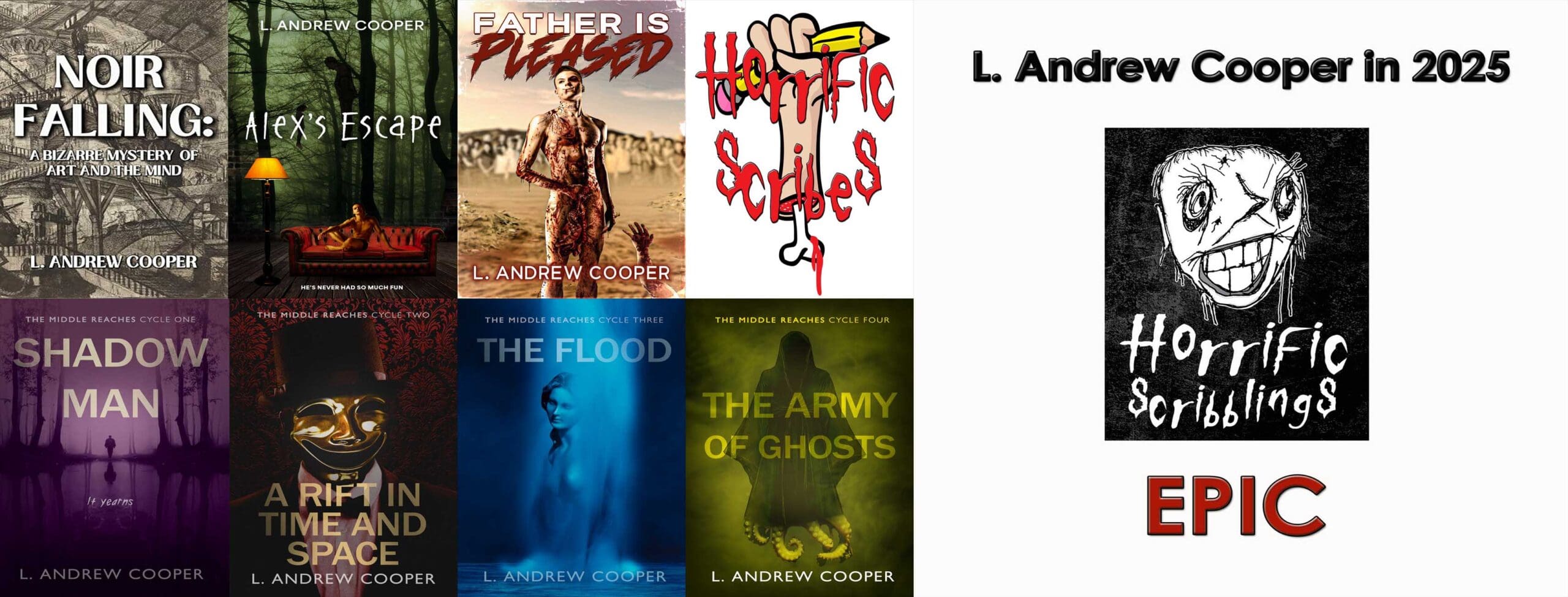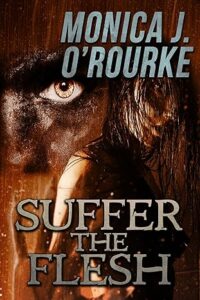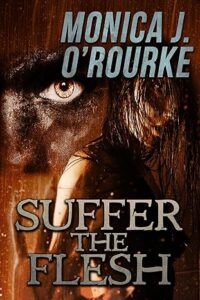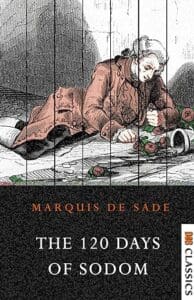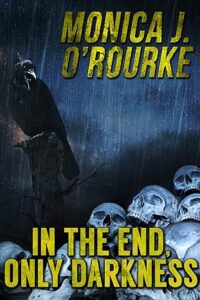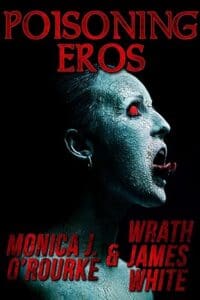Author Monica J. O’Rourke, legendary for her unpredictable and often very extreme horror short stories, novellas, and novels, is here to talk about some of her most famous—and notorious—works, which Crossroad Press celebrated through new editions not long ago.
Suffer the Flesh
Zoey Masterson didn’t know what pain was before, but she’s learning fast. Kidnapped off the Manhattan streets and whisked away from the safe, normal world she once knew, she finds herself the victim of one reprehensible man’s vision. Forced to witness the depravities of the seedy underworld where lust, rape, torture, and mutilation are a way of life, stripped of clothing, pride, and spirit, Zoey must play their games, bear their torture—but for how long? Somehow, she must learn to survive the daily perversions … but how can Zoey survive? How could anyone? Somewhere between ecstasy and pain—learn to SUFFER THE FLESH.
In the End, Only Darkness
Eighteen horror stories (and a few poems) ranging from quietly subtle to stomach-churning disgusting, this collection features fiction that will entertain or repulse almost anyone. Featuring an Introduction by gore master Wrath James White!
Read about a gynecological visit gone very wrong … a woman’s obsession with a Georgia O’Keeffe painting … a former sheriff forced to hunt children overtaken during a zombie plague … a mohel who performs circumcisions in a most unique way … or a graphic story about three young men who conduct an experiment on a fourth boy—an experiment held in a secret room involving melted metals.
Poisoning Eros (with Wrath James White)
Sometimes life is unfair. Sometimes life just plain sucks. You do what you can to get by, but sometimes even that isn’t enough.
Meet Gloria, aging porno star, drug addict, failed wife and mother—seduced into a monstrous world of depraved sex and violent deceit, battling to save her immortal soul and that of her only daughter from Inferno … and you thought your life was hell.
The Interview
(1) At a Crossroads? Even though one Amazon reviewer complains about Poisoning Eros once being “one of the most infamous—and hard to get a hold of—books in underground horror,” Deadite Press did editions of Poisoning Eros and Suffer the Flesh not long before Crossroad Press picked up all three titles we’re discussing and put them in company with works by Clive Barker, Joe Lansdale, and Jack Ketchum. I think the push to make your work available acknowledges its importance. The Crossroad editions might signal that you’re becoming part of the “canon” of modern horror. Do you agree? Why or why not? What would being a canonical horror writer mean for you?
MJO: I think all writers wants to be remembered for their work, but to be considered canon transcends even that. To be considered a canonical horror writer is a thrilling idea, that your work is something referred to time and again. I’m really grateful to the Daves at Crossroad for their amazing work, and there are a lot of great horror writers out there. I do hope someday to have something I’ve created be considered canon, but I know I have a really long way to go.
(2) The Politics of Extremity. Not all the stories in In the End, Only Darkness go to extremes, but you are known for delivering extreme violence, often extreme sexual violence, and the three works we’re discussing all deliver plenty. Has going to extremes ever been an obstacle in your career, particularly as the extreme end of horror tends to be even more of a boys’ club than horror in general? You often depict men committing violence against women in a way that seems to make a statement. Do you think characterizing your work as feminist is fair? Why or why not?
MJO: I was once accused by a friend of being a misogynist for the way I treat women in my stories. I told him my mistreatment of people wasn’t misogyny and asked if he saw the way I treated men as well. A long time ago my writing was cathartic—and I’ve killed off many people from my life through my stories.
I think years ago I was more militant in my approach, and not that I don’t have feminist ideals, because I still do, but maybe old(er) age is slowing me down in that regard. I don’t think my work has been intentionally feminist, because back in the day (say twenty or thirty years ago), I was writing for shock value. I would be approached by readers or reviewers who asked about the statement my story had made. See “Jasmine and Garlic” or “An Experiment in Human Nature” for examples. In “Experiment,” I wasn’t even aware of the homoerotic undercurrent that pervades that story. I was just writing about torture!
Surprisingly, I don’t think the extreme horror has been a hindrance, but I worry that it could be someday, such as when trying to sell a more mainstream novel, and my name has become synonymous with splatterpunk. But in a nutshell regarding extreme horror writing, when I first jumped into the fray in the late ’90s, early ’00s, very few women were writing extreme horror. My timing was excellent, and I got really lucky regarding the notoriety.
(3) Focus on Flesh. Suffer the Flesh depicts men who at least try to get away with torturing women physically by manipulating their self-consciousness and anxiety about their bodies not matching with social norms for feminine beauty. What led you to focus on women of size and issues surrounding body image in this novel? How do physical and psychological torture work together, and to what extent—if at all—is the former a metaphor for the latter?
MJO: I’m such a literal person… I wasn’t looking for the meaning or the metaphor when writing Suffer (which was published in 2004). That book came about for two reasons: I was friends with a small-press publisher who wanted to launch an extreme horror line and he asked me for a book, and I had read an article where the focus was on a study (this is mentioned in Suffer) where women who had lost weight said they would rather lose a limb than regain the weight. Back then I was considerably heavier than I am now, and again, the notoriety I received from that book made my head spin. Jack Ketchum, many years before we became close friends, said to me, “Be honest—did you write that book with your hand in your lap?” I was mortified! He was one of my idols. I wanted to crawl under a desk.
Physical and psychological torture are such extreme points. They can work together if you do them right. This is the problem I see with so many recent extreme horror novels. Some books are simply murder and torture by numbers—essentially a body count—but if you can’t relate to the characters or feel their plight, after a while the body-count-by-numbers grows tedious. With psychological torture, you can inflict far more pain that with the physical. Develop your characters first, and the rest will follow.
(4) Sadism in the Flesh. The setup for Suffer the Flesh, with a group of sadists imprisoning another group on whom they inflict perverse violations, reminds me a bit of the Marquis de Sade’s 120 Days of Sodom, to which you make direct reference in the story “An Experiment in Human Nature” (in In the End, Only Darkness). To what extent do you take inspiration from sadism’s namesake? The novel’s structure also brought to mind rape/revenge films such as I Spit on Your Grave (1978). To what extent did these films—or others—influence you?
MJO: Wow, you really do your homework! Yes, de Sade inspired “An Experiment in Human Nature,” and he also greatly influenced the novel. I was a huge fan of his work, initially because of the shocking extremism that I couldn’t believe had been published, but then after seeing movies such as Marat/Sade and Quills, I saw his work in a very different perspective. However, I despised Salò, or the 120 Days of Sodom. It was unbearably painful to watch, and I didn’t see the artistic value whatsoever (and here’s a woman who loved Caligula).
Rape/revenge films such as I Spit on Your Grave and Last House on the Left were shocking, and I was young when I first saw them (I was a child when they first came out, so I saw them in my teens). But they definitely influenced my writing. I was a huge fan of Wes Craven from a young age. My brother and I saw A Nightmare on Elm Street (1984) shortly after seeing The Last House on the Left for the first time. We both noticed he seemed fascinated by the name Krug/Krueger.
(5) Erotic Suffering. A review from Cemetery Dance quoted on Amazon describes Suffer the Flesh as “disturbingly erotic.” Do you intend for the book’s depiction of violent, generally non-consensual sex to turn readers on? What might readers take away from their disturbing erotic experiences with your work? What if the experiences aren’t disturbing, just erotic?
MJO: It’s funny, but I did expect to turn readers on. I was hoping the more extreme stuff wouldn’t be a turn-on, but I wasn’t judging! I’m sure there are people out there who found the really sick stuff erotic… and again, no judgment. And I’m not going to be specific here … but I knew that if certain scenes were turning me on, I figured it would affect some of the audience as well. (Ketchum’s remark about my hand in my lap wasn’t all that far-fetched.) Of course, my 1-star reviewers absolutely hated the book. I always wonder what they were expecting with the title Suffer the Flesh, especially since the description on Amazon was really clear! Disney this ain’t.
(6) In the End, I Laughed My Ass Off. I hope you meant it to be—and maybe I’m a sick fuck—but “Huntin’ Season” in In the End, Only Darkness is one of the funniest stories I’ve ever read. It’s not the only story in the collection with a delightful sense of humor, either, while other stories, such as “Five Adjectives about My Dad, by Nadine Specter” and “Maternal Instinct” deliver gut punches of shocking pathos. When assembling the collection, did you aim for emotional range? What techniques do you use to achieve different emotional responses while remaining in your own dark groove?
MJO: It’s trippy going over your own work when trying to sort it out. I was going for emotional range, and I also wanted readers to be able to come up for air from too much extreme.
Thank you for your remarks about “Huntin’ Season!” It’s actually one of my favorites. I love writing dark humor (there are other stories in that book, such as “Nurturing Type”—inspired by King’s “Survivor Type”—and “The Rest of Larry” that are filled with dark humor).
As for achieving emotional responses, I just know that if something affects me, makes me feel something—anger, despair, hatred, love—I’m probably doing something right. I hopefully work this through my characters. To be honest, the only technique I use is to keep writing… and see if it gets under my skin.
(7) In the Young, Only Darkness. Let’s talk about kids. In the End, Only Darkness includes two stories about zombie kids, one story about bad college-aged kids, and young things fetus-aged plus show up as horrors in several other stories as well. What is/are the relationship(s) between the young and the horrifying in your work?
MJO: Kids are an easy target, in real life and in fiction. I know writing about them is a pretty easy way to invoke an emotional response, which is why I don’t like to do it. I don’t want to make light of a child’s trauma or lessen the intensity of their abuse. But if an idea that happens to feature kids pops into my head, I try like mad to not make it exploitative in any regard whatsoever. In a story like “Huntin’ Season,” the plot is so outlandish—and absolutely impossible—that I thought I could get away with it this time.
(8) Darkness of Different Kinds. Suffer the Flesh is grounded in a nightmarish realism, which some stories in In the End, Only Darkness share, but other stories go all-out supernatural, such as “The Three Wishes of Henry Hoggan” and “One Breath.” What are your feelings about the supernatural versus the “realistic” in horror fiction? Does one appeal to you more than the other? Why or why not? Is one more important than the other? Why or why not?
MJO: The supernatural is entertaining, and temporarily scary (temporary because you can walk away from it). Unlike realistic horror, such as serial killers, which scare the bejeezus out of me. Because you can defeat the supernatural, for the most part (ignore The Exorcist and Hereditary, please!—there’s no escaping the horror in those brilliant movies), but once a sexually sadistic killer gets a hold of you … goodnight, nurse!
I don’t think one is more important than the other, but we all have our favorites.
(9) Poisoning Sympathy. Poisoning Eros also delves into the supernatural, which radically increases the extremity of the situations that Gloria, the lead character, finds herself in. Gloria is not a typically “likeable” character, but I find myself cheering for her anyway, and I doubt I’m the only reader on her side. How do you feel about her? What does and/or doesn’t make her a good hero? To what extent does her battle through Inferno have a sincere moral dimension? Is Poisoning Eros more about repudiating the herd morality that Friedrich Nietzsche says poisons eros or about showing the perspective—à la John Milton—of a dark soul on a catastrophic immoral quest?
MJO: Gloria is a character I loved to hate. It’s a strange thought, since she wasn’t a bad or evil character (her daughter, on the other hand …), she just did a few, um, objectionable things, heh. It also is probably because of the way Wrath (James White) and I wrote the books. We really kept each other on our toes. I’m not sure I would call her a hero because her motivations are selfish, and much of what she does that’s heroic happened by chance.
Her battle through hell absolutely has a moral dimension—and you can thank Wrath for that. He added depth to the book I was being rather flip about, such as religion and its consequences. Believe it or not I was still pretty religious when we wrote that first book. I think we leaned toward repudiating the herd morality, and this is something we both struggled with in our lives—such as the whys of organized religion or the reasons things happen the way they do (see for example the Lake of Fire scene for how we tried to work it out). Gloria is a dark soul on a catastrophic immoral quest, as you worded it, but I think she was more along for the ride.
(10) Eros Against Type. In his excellent introduction to the Crossroad Press edition of In the End, Only Darkness, Wrath James White, your co-author on Poisoning Eros, writes, “I assumed she would write all the girlie parts, [but] Monica left all the sensitive stuff to me and proceeded to gleefully tear into the violence, sex, and gore with a passion.” How much—if any—of your pleasure in writing such material comes from exploding people’s assumptions? What fuels your passion for representing suffering like what Gloria endures? Why do you think people (like myself) enjoy reading it?
MJO: I had a blast being “discovered” as a splatterpunk writer and was pleasantly surprised when people were shocked a woman had written what I wrote. Like I mentioned earlier, not a lot of women wrote extreme back then, at least not compared to the number of men. Putting characters like Gloria through the ringer is just too much fun. It messes with my mind as much as it does the readers’! Why do people (like you) enjoy reading it? Because you’re sickos! In a good way. 🙂
And by the way, Wrath and I are about to embark on a new collaboration, an idea we’ve been kicking around for years.
Thank you for your wonderful questions!
About the Author
Monica J. O’Rourke is a freelance editor/writer and book coach who spends her days ignoring her own writing and correcting other people’s grammar. She’s had short fiction published in anthologies and magazines such as Clickers Forever, Nasty Piece of Work (remember them?), Fangoria. Chiral Mad and Horror for Good (for charity). She is the author of Poisoning Eros I and II (with Wrath James White), Suffer the Flesh, What Happens in the Darkness, and the collection In the End, Only Darkness. Her books and stories have been published in the Czech Republic, Germany, Greece, Poland, and Russia. Find her on facebook.com/MonicaJORourke. You just know she’s never going to finish putting together an actual website.
